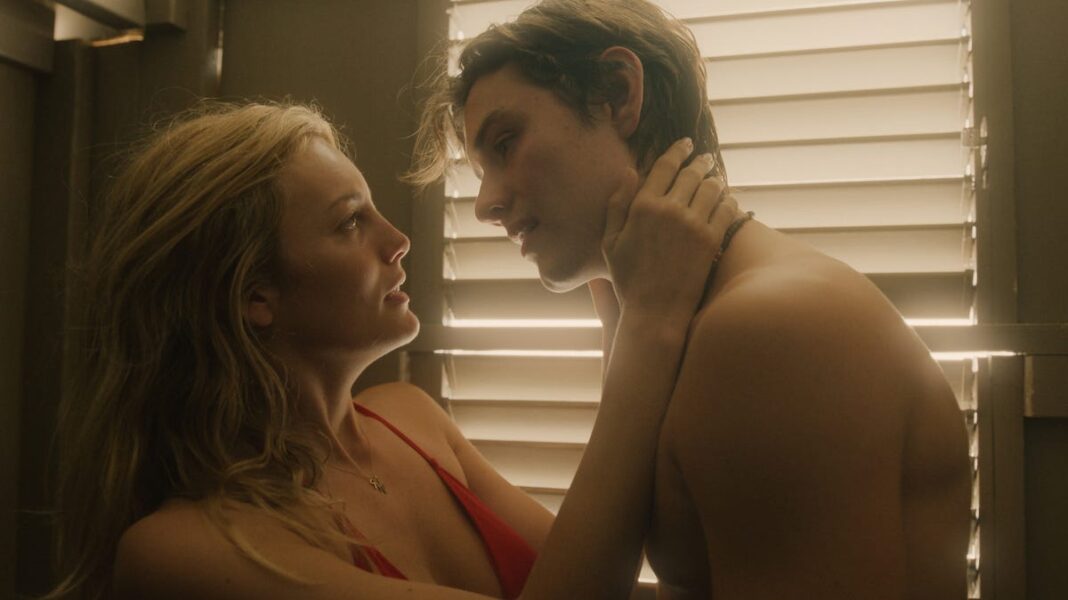‘Disclaimer’ cast discusses the ‘horrifying’ and ‘shocking’ final twist (spoilers)
Warning: This article contains spoilers for the series finale of “Disclaimer” (currently available on Apple TV+).
Leila George was surprised to learn that her character in “Disclaimer” received mixed reactions from viewers.
In the Apple TV+ series, the Australian actress portrays Catherine Ravenscroft, a married mother who engages in a romantic affair with a younger man named Jonathan (Louis Partridge). Tragically, he drowns while attempting to save her young son at an Italian beach. Years later, Catherine (now played by Cate Blanchett) is a successful documentarian but finds herself under attack from Jonathan’s vengeful father, Stephen Brigstocke (Kevin Kline), who publishes a damaging novel based on the alleged affair.
This novel, penned by Stephen’s late wife, Nancy (Lesley Manville), serves as an act of retribution against Catherine after her death from cancer.
“I’m always taken aback by how much viewers dislike Catherine after just a few episodes,” George noted. At a recent screening, “my friends had a lot of questions, but many said, ‘Oh, she’s so terrible.’ I wanted to tell them, ‘Just wait and see!’ I never expected that some viewers might dislike me for a while.”
However, viewers’ perceptions are likely to shift dramatically after watching the seventh and final episode, in which an emotional Catherine confronts Stephen about the true nature of her relationship with Jonathan. Despite a series of romantic flashbacks suggesting a passionate affair, Catherine reveals there was no affair; instead, Jonathan stalked her at her hotel and then assaulted her.
Partridge, aged 21, was unaware of this plot twist during his audition for writer-director Alfonso Cuarón, and the character’s violent actions shocked him when he read the seventh episode.
“I was informed there would be some nudity, but that was about it,” Partridge shared. “I had no idea about my character’s darker side, which was initially quite intimidating.” He also hadn’t read the novel by Renée Knight that the series is based on. As a result, they had to collaboratively develop Jonathan’s backstory, exploring what could drive someone to act in such a terrible way.
George, 32, faced significant challenges while portraying the scene involving nude photographs taken by Jonathan, which Stephen later uses to blackmail her. Early flashbacks frame the photos as seductive, but the finale reveals that Jonathan intended to intimidate and degrade Catherine.
“Matching the tone of the photos was tricky because they needed to reflect both perspectives,” George explains. “It was tough for me to act tortured while delivering a believable smile that would appear seductive, while knowing the horrific reality of the situation.”
During filming, the actors performed the assault scene with dialogue. However, in the editing process, Cuarón opted to replace spoken words with narration from Blanchett.
“It’s such a distressing visual that showing too much could feel like exploiting the situation,” George remarks. “Cuarón brilliantly emphasized Catherine’s storytelling, shifting the focus to her perspective as a survivor, rather than making it a shocking spectacle.”
Cuarón also aimed to ensure that the characters were noticeably different across timelines, so viewers should not look for indications of Jonathan’s true nature in earlier episodes during a rewatch.
“I thought Alfonso would prefer there to be a hint revealing the truth, but he aimed for a clear separation. We only learn about the actual events later on, and we don’t want the audience guessing,” Partridge explains. “Our goal was to make them strikingly distinct, showcasing a wide-eyed, innocent child versus a self-centered aggressor. As an actor, bridging that gap is quite a challenge.”
However, there’s merit in revisiting “Disclaimer,” especially considering how Jonathan’s controlling mother, Nancy, likely overlooked his unsettling actions.
“She’s intent on viewing her son as this perfect angel, even though she must know what he’s capable of,” George shares. “When you realize the first four episodes are presented from her viewpoint, it’s clear that Catherine embodies complete male fantasy. You notice her approaching Jonathan with light streaming behind her and music playing, which seems almost humorous. The second time I viewed it, I almost chuckled at those scenes because they’re comically idealized, yet you initially buy into it, believing it to be real.”
In essence, “Disclaimer” tells a survivor’s narrative. “We often hear that women fear speaking out about their experiences,” George notes. “If they take it to court, they face accusations like, ‘You were asking for it’ or ‘You were wearing a revealing dress.’ Catherine navigates through these questions herself and concludes that it isn’t worth the risk of being attacked again.”
She tries to confide in her husband, Robert (Sacha Baron Cohen), about the assault towards the end of Episode 2. However, his fury over Catherine’s alleged betrayal prevents her from speaking.
“It was so painful to witness him let his own insecurities overshadow the real trauma that his wife endured, the very person who needs his support,” George expresses. “It’s utterly heartbreaking.”

